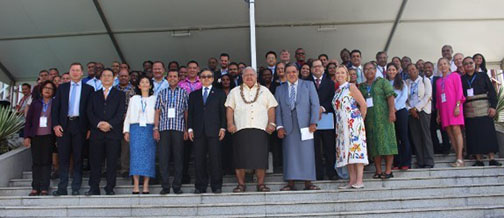CARICOM has expressed concern about the pace of implementing steps for the sustainable development of Small Island Developing States (SIDS).
According to a CARICOM press release, at the recently concluded Inter-Regional Preparatory Meeting for the Midterm Review of the SAMOA Pathway in Apia, Samoa, CARICOM expressed the view that SIDS face peculiar challenges with transforming their economies and societies for sustained, inclusive and equitable growth.
The SIDS Accelerated Modalities of Action (S.A.M.O.A) Pathway was adopted at the Third International Conference of Small Island Developing States (SIDS Conference) on September 2014, in Apia, Samoa.
In 2016, the UN General Assembly (UNGA) agreed to dedicate one day in September 2019, to review the progress made in addressing the priorities of SIDS as outlined in the SAMOA Pathway, the CARICOM release added.
During its 72nd session in 2017, the UNGA further agreed to the convening of regional and inter-regional preparatory meetings, to review how the SAMOA Pathway has been implemented at the national and regional levels. The Caribbean Regional Review took place in San Pedro Belize in August 2018.
At the recent Inter-Regional Preparatory Meeting in Samoa, CARICOM was represented by Antigua and Barbuda, The Bahamas, Barbados, Belize, Guyana, Jamaica, St. Lucia, St. Kitts and Nevis, St. Vincent and the Grenadines, Suriname and Trinidad and Tobago. The CARICOM Secretariat also participated and provided support through its Sustainable Development and Regional Statistics Programmes.
Also in attendance were 200 delegates from all three SIDS regions (Caribbean, Pacific and the AIS Region [African, Indian Ocean and South China Sea]), UN Agencies and other international and regional organizations, development partners and stakeholders.
CARICOM underscored that building a sustainable and resilient Caribbean was challenged by climate change and other environmental-related stressors. SIDS faced limitations in achieving financial and economic sustainability, with issues such as adverse debt, and the de-risking strategies of some international financial institutions. Therefore the need for strengthening institutions and enabling environments for people-centred development, were critical elements in meeting the targets of the SAMOA Pathway.
When the CARICOM Heads of Government met in July 2018 in Montego Bay, Jamaica recalled that the SIDS Framework, which had its origin in the Barbados Programme of Action of 1994, had been complemented by the Mauritius Strategy of Implementation (MSI) of 2005 and the SAMOA Pathway. These frameworks placed specific focus on the unique vulnerabilities of SIDS and provided the basic framework for international cooperation.
The Heads of Government while expressing their concerns about the slow pace of implementation of the SAMOA Pathway, have agreed that they would work closely with the International Community in the 2019-2024 period in an effort to quicken the process.





